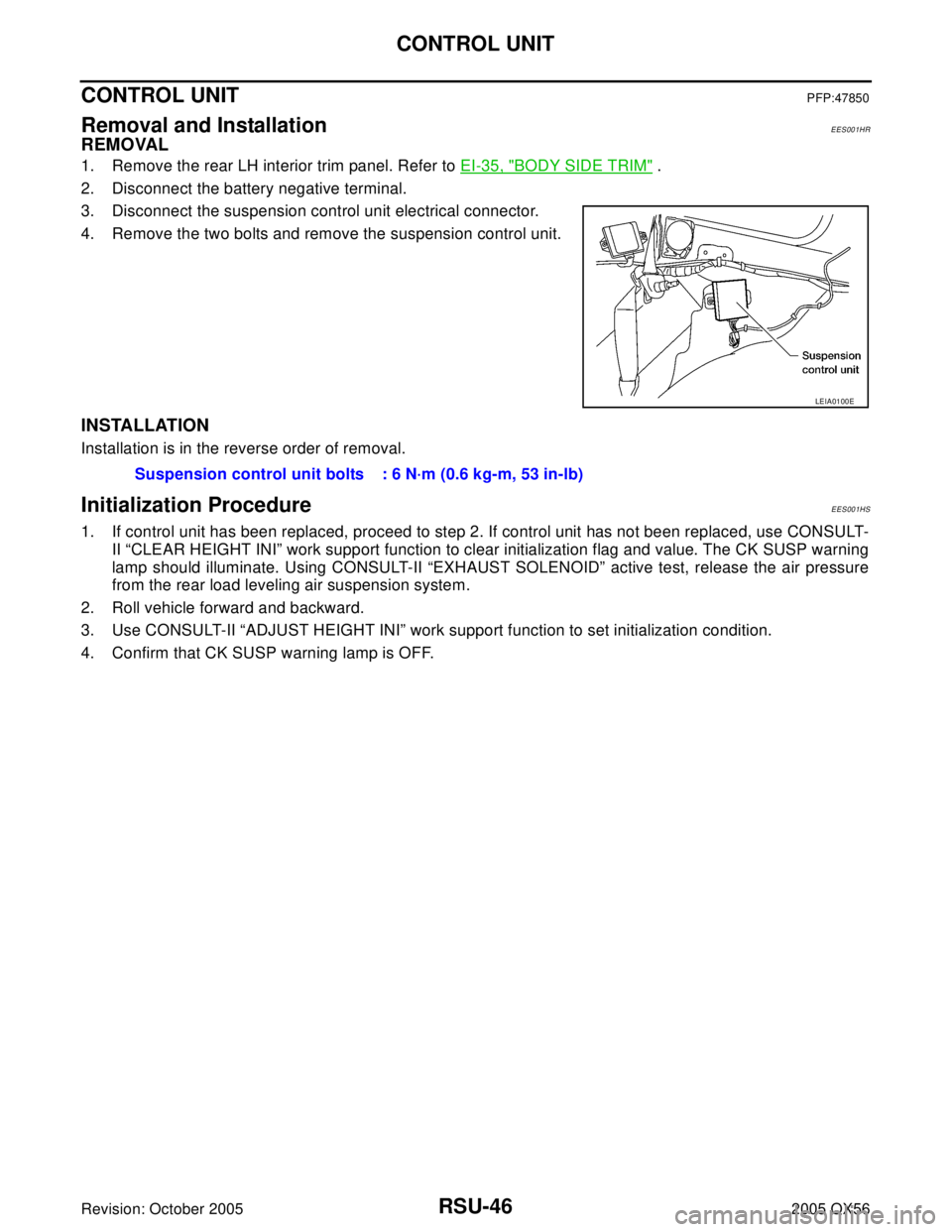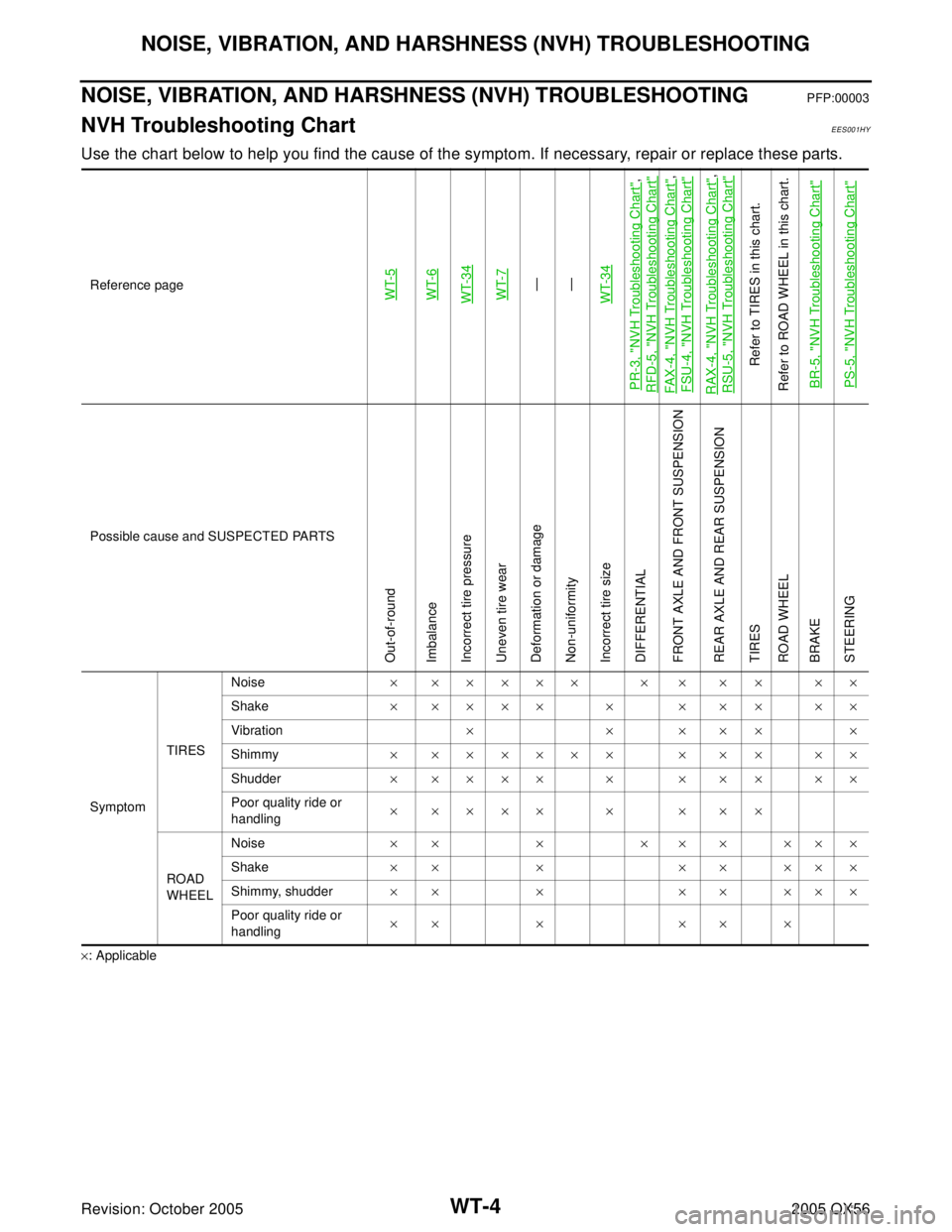Page 2919 of 3419
RSU-44
HEIGHT SENSOR
Revision: October 20052005 QX56
HEIGHT SENSORPFP:53820
Removal and InstallationEES001HQ
Rear Load Leveling Air Suspension System
REMOVAL
1. Use CONSULT-II “EXHAUST SOLENOID” active test to release the air pressure from the rear load level-
ing air suspension system.
2. Disconnect the electrical connector for the height sensor.
3. Remove the two height sensor bolts and height sensor arm
bracket bolt.
4. Remove the height sensor.
LEIA0072E
1. Rear load leveling air suspension
hose, RH2. Shock absorber, RH 3. Height sensor
4. Rear load leveling air suspension
hose, LH5. Shock absorber, LH 6. Rear load leveling air suspension
compressor assembly
LEIA0080E
Page 2921 of 3419

RSU-46
CONTROL UNIT
Revision: October 20052005 QX56
CONTROL UNITPFP:47850
Removal and InstallationEES001HR
REMOVAL
1. Remove the rear LH interior trim panel. Refer to EI-35, "BODY SIDE TRIM" .
2. Disconnect the battery negative terminal.
3. Disconnect the suspension control unit electrical connector.
4. Remove the two bolts and remove the suspension control unit.
INSTALLATION
Installation is in the reverse order of removal.
Initialization ProcedureEES001HS
1. If control unit has been replaced, proceed to step 2. If control unit has not been replaced, use CONSULT-
II “CLEAR HEIGHT INI” work support function to clear initialization flag and value. The CK SUSP warning
lamp should illuminate. Using CONSULT-II “EXHAUST SOLENOID” active test, release the air pressure
from the rear load leveling air suspension system.
2. Roll vehicle forward and backward.
3. Use CONSULT-II “ADJUST HEIGHT INI” work support function to set initialization condition.
4. Confirm that CK SUSP warning lamp is OFF.
LEIA0100E
Suspension control unit bolts : 6 N·m (0.6 kg-m, 53 in-lb)
Page 2923 of 3419
RSU-48
SERVICE DATA AND SPECIFICATIONS (SDS)
Revision: October 20052005 QX56
Wheelarch Height (Unladen*1 )EES001HV
Unit: mm (in)
*1: Fuel, engine coolant and engine oil full. Spare tire, jack, hand tools and mats in designated positions.
*2: Verify the vehicle height. If vehicle height is not within ± 10 mm (0.39 in) of the specification, perform the control unit initialization pro-
cedure. Refer to RSU-46, "
Initialization Procedure" . Suspension type
Air leveling*
2
Applied model4x2 4x4
Front wheelarch height (Hf)913
(35.94)931
(36.65)
Rear wheelarch height (Hr)912
(35.91)932
(36.69)
LEIA0085E
Page 3326 of 3419

WT-1
ROAD WHEELS & TIRES
E SUSPENSION
CONTENTS
C
D
F
G
H
I
J
K
L
M
SECTION WT
A
B
WT
Revision: October 20052005 QX56 PRECAUTIONS .......................................................... 2
Precautions for Supplemental Restraint System
(SRS) “AIR BAG” and “SEAT BELT PRE-TEN-
SIONER” .................................................................. 2
PREPARATION ........................................................... 3
Special Service Tool ................................................. 3
Commercial Service Tools ........................................ 3
NOISE, VIBRATION, AND HARSHNESS (NVH)
TROUBLESHOOTING ................................................ 4
NVH Troubleshooting Chart ..................................... 4
WHEEL ....................................................................... 5
Inspection ................................................................. 5
WHEEL AND TIRE ASSEMBLY ................................. 6
Balancing Wheels .................................................... 6
REMOVAL ............................................................. 6
WHEEL BALANCE ADJUSTMENT ...................... 6
Rotation .................................................................... 7
LOW TIRE PRESSURE WARNING SYSTEM ............ 8
System Components ................................................ 8
System Description .................................................. 8
TRANSMITTER ..................................................... 8
REMOTE KEYLESS ENTRY RECEIVER ............. 8
BCM (BODY CONTROL MODULE) ...................... 9
WARNING LAMP AND BUZZER .......................... 9
DISPLAY UNIT ...................................................... 9
CAN COMMUNICATION .......................................... 10
System Description ................................................ 10
TROUBLE DIAGNOSES ...........................................11
Wiring Diagram .......................................................11
BCM Input/Output Signal Standard ........................ 13
ID Registration Procedure ...................................... 14
ID REGISTRATION WITH TRANSMITTER
ACTIVATION TOOL ............................................ 14
ID REGISTRATION WITHOUT TRANSMITTER
ACTIVATION TOOL ............................................ 15
Transmitter Wake Up Operation ............................. 16
WITH TRANSMITTER ACTIVATION TOOL ........ 16
CONSULT-II Function (BCM) ................................. 17
Self-Diagnosis ........................................................ 18DESCRIPTION .................................................... 18
FUNCTION .......................................................... 18
CONSULT-II ......................................................... 18
How to Perform Trouble Diagnosis for Quick and
Accurate Repair ...................................................... 20
INTRODUCTION ................................................. 20
WORK FLOW ...................................................... 20
Preliminary Check .................................................. 21
Malfunction Code/Symptom Chart .......................... 22
TROUBLE DIAGNOSIS FOR SELF-DIAGNOSTIC
ITEMS ........................................................................ 24
Inspection 1: Transmitter or Control Unit (BCM) ..... 24
MALFUNCTION CODE NO. 21, 22, 23 OR 24 ... 24
Inspection 2: Transmitter - 1 ................................... 24
MALFUNCTION CODE NO. 31, 32, 33, 34, 41,
42, 43, 44, 45, 46, 47 OR 48 ............................... 24
Inspection 3: Transmitter - 2 ................................... 25
MALFUNCTION CODE NO. 35, 36, 37 OR 38 ... 25
Inspection 4: Vehicle Speed Signal ........................ 26
MALFUNCTION CODE NO. 52 ........................... 26
TROUBLE DIAGNOSIS FOR SYMPTOMS .............. 27
Inspection 1: Warning Lamp Does Not Come On
When Ignition Switch Is Turned On ........................ 27
Inspection 2: Warning Lamp Stays On When Ignition
Switch Is Turned On ............................................... 27
Inspection 3: Warning Lamp Flashes When Ignition
Switch Is Turned On ............................................... 29
Inspection 4: Hazard Warning Lamp Flashes When
Ignition Switch Is Turned On .................................. 30
Inspection 5: “TIRE PRESSURE” Information In
Display Unit Does Not Exist .................................... 31
Inspection 6: ID Registration Cannot Be Completed ... 31
REMOVAL AND INSTALLATION ............................. 32
Transmitter (Pressure Sensor) ............................... 32
REMOVAL ........................................................... 32
INSTALLATION ................................................... 32
SERVICE DATA AND SPECIFICATIONS (SDS) ...... 34
Road Wheel ............................................................ 34
Tire ......................................................................... 34
Page 3329 of 3419

WT-4
NOISE, VIBRATION, AND HARSHNESS (NVH) TROUBLESHOOTING
Revision: October 20052005 QX56
NOISE, VIBRATION, AND HARSHNESS (NVH) TROUBLESHOOTINGPFP:00003
NVH Troubleshooting ChartEES001HY
Use the chart below to help you find the cause of the symptom. If necessary, repair or replace these parts.
×: ApplicableReference page
WT-5WT-6WT-34WT-7—
—
WT-34
PR-3, "
NVH Troubleshooting Chart
",
RFD-5, "
NVH Troubleshooting Chart
"
FAX -4, "
NVH Troubleshooting Chart
",
FSU-4, "
NVH Troubleshooting Chart
"
RAX-4, "
NVH Troubleshooting Chart
",
RSU-5, "
NVH Troubleshooting Chart
"
Refer to TIRES in this chart.
Refer to ROAD WHEEL in this chart.
BR-5, "
NVH Troubleshooting Chart
"
PS-5, "
NVH Troubleshooting Chart
"
Possible cause and SUSPECTED PARTS
Out-of-round
Imbalance
Incorrect tire pressure
Uneven tire wear
Deformation or damage
Non-uniformity
Incorrect tire size
DIFFERENTIAL
FRONT AXLE AND FRONT SUSPENSION
REAR AXLE AND REAR SUSPENSION
TIRES
ROAD WHEEL
BRAKE
STEERING
SymptomTIRESNoise× ××××× × × × × ××
Shake××××× × ××× ××
Vibration××××××
Shimmy× ×××××× × × × ××
Shudder××××× × ××× ××
Poor quality ride or
handling××××× × ×××
ROAD
WHEELNoise×××××××××
Shake×× × ×× ×××
Shimmy, shudder×× × ×× ×××
Poor quality ride or
handling×× × ×× ×
Page 3330 of 3419
WHEEL
WT-5
C
D
F
G
H
I
J
K
L
MA
B
WT
Revision: October 20052005 QX56
WHEELPFP:40300
InspectionEES001HZ
1. Check tires for wear and improper inflation.
2. Check wheels for deformation, cracks and other damage. If
deformed, remove wheel and check wheel runout.
a. Remove tire from wheel and mount wheel on a tire balance
machine.
b. Set dial indicator as shown in the illustration. Refer to WT-34,
"Road Wheel" .
3. Check front wheel bearings for looseness.
4. Check front suspension for looseness.
SFA975B